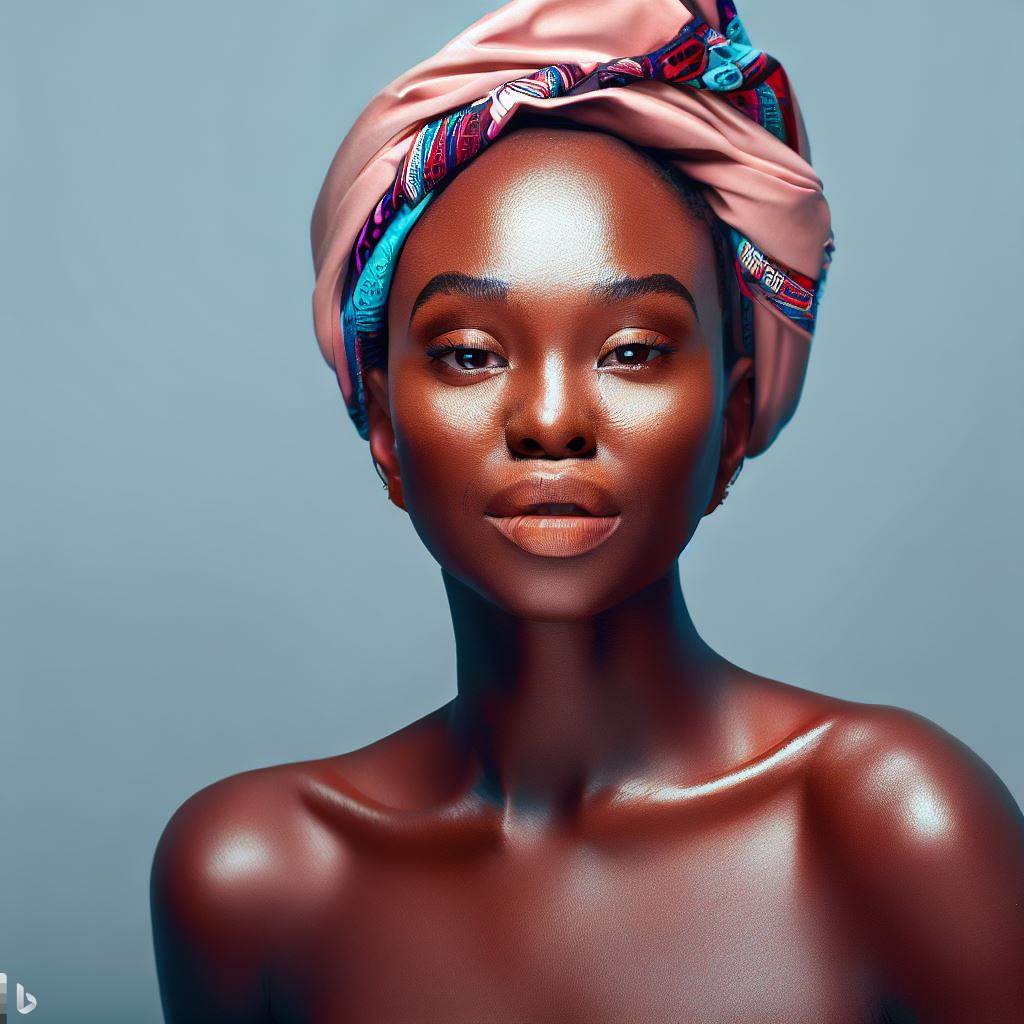Introduction to the Makeup Industry in Nigeria
The makeup industry in Nigeria has experienced significant growth in recent years, becoming a thriving and profitable sector.
The makeup industry encompasses the production, marketing, and sale of cosmetic products, including cosmetics, skincare, and beauty tools.
Nigeria’s makeup industry has surged, reflecting changing beauty standards and preferences.
Defining Makeup Industry
This dynamic sector encompasses:
- Cosmetics
- Skincare
- Beauty products
- Professional makeup services
The convergence of these elements forms the vibrant makeup industry landscape in Nigeria.
Historical Background of the Makeup Industry in Nigeria
Origins of makeup usage in Nigeria
Makeup has been used in Nigeria since ancient times. Ancient Nigerians used natural substances like clay, plant extracts, and pigments for cosmetic purposes.
Archaeological findings have revealed evidence of makeup application dating back thousands of years.
Traditional makeup practices in Nigerian culture
Nigerian tribes had their unique makeup practices.
- The Yoruba tribe used indigo dye and henna for body art and makeup.
- The Hausa tribe incorporated bold eye makeup using kohl and henna for intricate designs.
- The Igbo tribe used colorful pigments and patterns for face painting during festivals and ceremonies.
Influence of Western makeup trends in Nigeria
With colonization, Western makeup products entered the Nigerian market.
- The introduction of cosmetics by European traders in the 19th century influenced Nigerian beauty standards.
- Nigerian women started adopting Western makeup trends, such as wearing lipstick, foundation, and eyeshadow.
- The popularity of Western-inspired makeup increased with the rise of Nollywood, Nigeria’s booming film industry.
- Celebrities and beauty influencers played a significant role in promoting Western makeup styles.
The makeup industry in Nigeria has a rich historical background. Ancient Nigerians used natural substances for cosmetic purposes, and different tribes had their own traditional makeup practices.
With the influence of Western makeup trends during colonization, Nigerian women started embracing Western styles.
The growth of Nollywood and the impact of beauty influencers further popularized Western-inspired makeup in Nigeria.
Read: Networking Tips for Aspiring Artists’ Agents in Nigeria
Factors Contributing to the Growth of the Makeup Industry in Nigeria
Increasing disposable income among Nigerians
- The makeup industry in Nigeria has experienced significant growth due to the increasing disposable income among Nigerians.
- As more Nigerians have more money to spend, they are willing to invest in makeup products and services.
- With a higher disposable income, Nigerians can afford to purchase high-quality makeup products and access professional makeup services.
- This increased spending power has contributed to the growth and expansion of the makeup industry in Nigeria.
- Makeup has become a status symbol, and Nigerians are willing to invest in their appearance.
Influence of social media on beauty standards
- Social media has played a significant role in shaping beauty standards in Nigeria.
- Platforms like Instagram and YouTube have allowed makeup trends and techniques to spread rapidly.
- Nigerians are constantly exposed to beauty influencers and their glamorous makeup looks.
- This influence has fueled the desire for makeup products and services, contributing to the growth of the industry.
- Social media has created a culture where makeup is seen as a form of self-expression and creativity.
Rise of beauty influencers and makeup artists
- The rise of beauty influencers and makeup artists in Nigeria has had a major impact on the growth of the makeup industry.
- These influencers and artists have built strong online followings and have become trusted sources for makeup recommendations.
- Nigerians often look to these influencers and artists for inspiration and advice on makeup techniques and products.
- Beauty influencers and makeup artists have helped popularize specific brands and products, driving the industry forward.
- Their expertise and influence have made makeup more accessible and desirable to Nigerians.
Expansion of product availability and diversity
- The availability and diversity of makeup products in Nigeria have greatly increased in recent years.
- International makeup brands have recognized the potential of the Nigerian market and have expanded their distribution networks.
- This expansion has led to a wider range of products being available to Nigerian consumers.
- Nigerians now have access to a variety of makeup brands catering to different skin tones, types, and preferences.
- The diversity in product offerings has contributed to the growth of the makeup industry by meeting the needs and desires of Nigerian consumers.
In the end, several factors have contributed to the growth of the makeup industry in Nigeria. The increasing disposable income among Nigerians has allowed them to invest in makeup products and services.
The influence of social media on beauty standards has fueled the desire for makeup. The rise of beauty influencers and makeup artists has made makeup more accessible and desirable.
Lastly, the expansion of product availability and diversity has catered to the specific needs and preferences of Nigerian consumers.
All these factors combined have led to the exponential growth of the makeup industry in Nigeria.
Read: Challenges Faced by Sound Effects Editors in Nigeria
Economic Impact of the Makeup Industry in Nigeria
Contribution to the country’s GDP
- The makeup industry in Nigeria has experienced significant growth in recent years.
- Its contribution to the country’s Gross Domestic Product (GDP) cannot be overlooked.
- The industry has become a major economic driver, generating substantial revenue for the country.
- It has created a multi-billion dollar market that continues to expand rapidly.
- Consumers in Nigeria are increasingly investing in makeup products and services, boosting the economy.
- The revenue generated from the makeup industry contributes to government revenue through taxes.
- As the industry continues to grow, its contribution to GDP is expected to increase significantly.
Job creation and entrepreneurship opportunities
- The growth of the makeup industry in Nigeria has led to the creation of numerous job opportunities.
- There is now a high demand for skilled makeup artists and professionals in the country.
- This has resulted in the emergence of makeup schools and training centers to meet the demand.
- Young Nigerians are now pursuing careers in makeup artistry, which was previously uncommon.
- The industry also provides entrepreneurship opportunities for individuals to start their own makeup businesses.
- Many entrepreneurs have successfully built their brands and are now contributing to the economy.
- Job creation and entrepreneurship in the makeup industry have helped reduce unemployment in Nigeria.
Boost to local and international brands
- The growth of the makeup industry in Nigeria has created a platform for local brands to thrive.
- Homegrown makeup brands are gaining popularity and recognition both locally and internationally.
- These brands are now competing with international brands and successfully capturing a significant market share.
- Local brands are promoting Nigerian culture and diversity through their makeup products.
- International makeup brands are also benefiting from the growth of the industry in Nigeria.
- They are expanding their presence in the country, setting up stores and distribution networks.
- The partnership between local and international brands has fostered collaboration and innovation in the industry.
In fact, the makeup industry in Nigeria has made significant economic contributions to the country. Its impact on the GDP, job creation, and entrepreneurship opportunities cannot be ignored.
Additionally, the growth of the industry has provided a platform for both local and international makeup brands to thrive.
With its continuous expansion, the makeup industry in Nigeria is set to contribute even more to the country’s economy in the future.
Read: Tips to Navigate the Makeup Artist Career Path in Nigeria

Socio-Cultural Implications of the Makeup Industry in Nigeria
Redefining Beauty Standards and Self-expression
- The makeup industry in Nigeria has played a significant role in redefining beauty standards.
- Nigerian women are now embracing diverse beauty ideals and expressing themselves through makeup.
- The industry has empowered women to experiment with different looks and enhance their self-confidence.
- Makeup allows women to showcase their creativity and individuality, breaking traditional beauty norms.
- This shift in beauty standards has created a more inclusive and accepting society in Nigeria.
Effect on the Perception of Beauty among Nigerian Women
- The growth of the makeup industry has influenced how Nigerian women perceive beauty.
- Women now recognize that beauty comes in different forms and is not limited to traditional ideals.
- They have started embracing their unique features and understanding that beauty is subjective.
- The industry has helped Nigerian women celebrate their natural beauty while enhancing their best features.
- This change in perception has boosted their self-esteem and contributed to a more positive body image.
Challenges and Criticism Faced by the Industry
- Despite its growth, the makeup industry in Nigeria faces challenges and criticism.
- Some critics argue that makeup promotes a superficial and materialistic culture.
- Others claim that it reinforces Eurocentric beauty standards, neglecting Nigeria’s diverse cultures.
- The industry also faces challenges related to counterfeit products and lack of regulation.
- Additionally, there is a need to address affordability, as some quality products are inaccessible to many.
In essence, the makeup industry in Nigeria has had significant socio-cultural implications. It has redefined beauty standards by promoting self-expression and embracing diverse ideals.
Nigerian women now have a more inclusive perception of beauty, celebrating their uniqueness.
Despite challenges and criticism, the industry has empowered women and contributed to a more positive body image.
However, there is room for improvement in addressing affordability and cultural representation within the industry.
Read: Inspiring Stories of Successful Nigerian Makeup Artists
Challenges Faced by the Makeup Industry in Nigeria
The growth of the makeup industry in Nigeria has been remarkable, but it is not without its fair share of challenges. Understanding and addressing these challenges is crucial for the industry’s continued success.
In this section, we will explore three major challenges: counterfeit and substandard products, lack of regulation and industry standards, and limited access to education and professional training.
Counterfeit and Substandard Products
- Counterfeit and substandard makeup products flood the Nigerian market.
- These products often contain harmful ingredients and pose serious health risks.
- Consumers may unknowingly purchase these products due to their lower prices.
- The proliferation of counterfeit makeup products undermines the reputation of genuine brands.
Lack of Regulation and Industry Standards
- The makeup industry in Nigeria lacks proper regulation and standardized guidelines.
- There is no regulatory body responsible for ensuring product safety and quality.
- Without industry standards, it becomes challenging to differentiate between genuine and counterfeit products.
- The absence of regulations also leads to unfair competition and hampers the growth of legitimate businesses.
Limited Access to Education and Professional Training
- Access to education and professional training in the makeup industry is limited in Nigeria.
- Many aspiring makeup artists lack the knowledge and skills necessary for success.
- Without proper training, artists may struggle to meet industry standards and deliver high-quality services.
- The lack of educational opportunities hinders the industry’s overall growth and development.
To overcome these challenges, various stakeholders need to collaborate and take proactive measures.
- The government should establish regulatory bodies to ensure product safety and quality.
- Strict enforcement of existing laws can help deter the sale and distribution of counterfeit products.
- Industry associations and professional bodies should work together to develop standardized guidelines.
- These guidelines can cover everything from product labeling to professional certifications.
- Investing in education and training programs will equip aspiring makeup artists with the necessary skills.
- Partnerships with established beauty schools and training institutes can bridge the education gap.
By addressing these challenges, the makeup industry in Nigeria can continue to thrive and contribute to the country’s economy.
Consumers will have access to safe and high-quality products, and professionals will receive the training needed for success.
Through collective efforts, Nigeria can establish itself as a hub for the makeup industry in Africa.
Future Outlook of the Makeup Industry in Nigeria
In recent years, the makeup industry in Nigeria has experienced significant growth, and it shows promising potential for even further expansion and development.
This can be attributed to various factors, including the increasing demand for beauty products, the rise of social media influencers, and the growing middle class in the country.
Potential for further growth and development
The Nigerian makeup industry has a large consumer base, consisting of both urban and rural populations, which provides ample opportunities for growth.
With the rise of social media and online platforms, Nigerian makeup artists and entrepreneurs can now reach a global audience, expanding their business prospects.
There is a significant increase in the number of makeup schools and training centers, developing a skilled workforce that contributes to the sector’s growth.
As more international beauty brands recognize the potential of the Nigerian market, they are expanding their operations and introducing diverse product offerings.
Embracing sustainability and ethical practices
There is a growing demand for sustainable and ethically-produced makeup products in Nigeria, signaling a shift towards conscious consumerism.
Local makeup brands are increasingly focusing on using natural and organic ingredients, reducing harmful chemicals and promoting eco-friendly packaging.
Consumers are also becoming more aware of animal testing practices, promoting the need for cruelty-free and vegan makeup options.
Role of technology and innovation in shaping the industry
Technology has revolutionized the way makeup is marketed and consumed in Nigeria, with online platforms enabling seamless shopping experiences.
Virtual try-on tools and augmented reality applications are gaining popularity, allowing consumers to visualize products before making a purchase.
The use of social media influencers and beauty bloggers has amplified brand visibility, driving sales and shaping trends in the Nigerian makeup industry.
Continuous innovation in product formulations, such as long-lasting and sweat-proof makeup, is addressing the needs of the Nigerian climate and lifestyle.
In a nutshell, the future outlook of the makeup industry in Nigeria appears promising, with the potential for further growth and development.
Embracing sustainability and ethical practices will ensure the industry’s long-term success, while technology and innovation will continue to shape consumer experiences.
As the industry expands, it is important for stakeholders to prioritize inclusivity, diversity, and quality to meet the diverse needs of Nigerian consumers.
Conclusion
A recap of the key points discussed
- The makeup industry in Nigeria has experienced significant growth and development.
- Increased social media usage has played a crucial role in the industry’s expansion.
- Nigerian makeup artists have gained international recognition for their talent and creativity.
- Local cosmetic brands have emerged and flourished, offering a wide range of affordable products.
- The industry provides employment opportunities for many Nigerians, particularly women.
Hope for the continued growth and success of the makeup industry in Nigeria
- The demand for makeup products and services in Nigeria is unlikely to decline.
- With continued investment and support, the industry can further innovate and expand its offerings.
- Government policies that support local businesses and regulate the industry will contribute to its success.
- Educational and training programs can enhance the skills of makeup artists and improve the industry’s standards.
- Efforts to promote diversity and inclusivity will attract a wider customer base and contribute to growth.
The makeup industry in Nigeria is poised for continued growth and success, with ample opportunities for both entrepreneurs and consumers. The future looks promising for this vibrant and dynamic sector.




